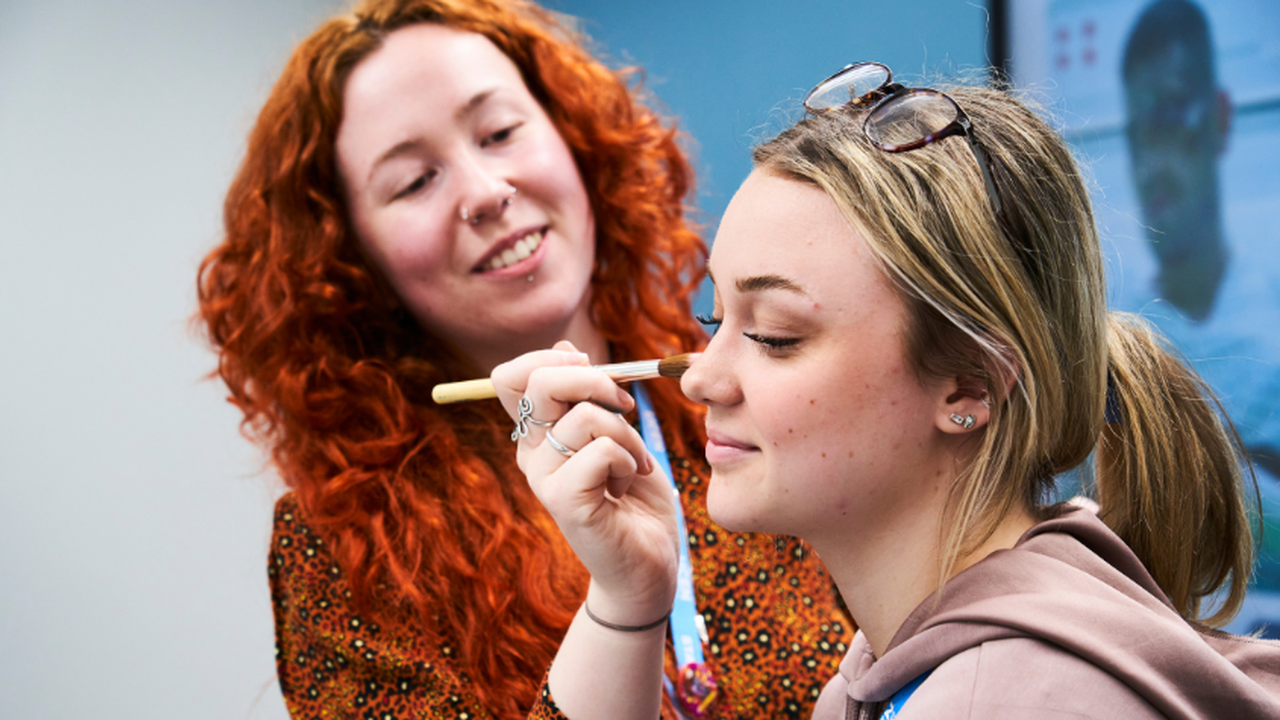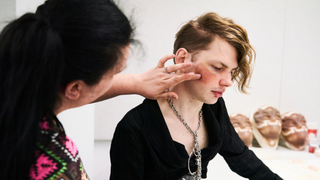What Are The Steps to Become a Make-Up Artist?

If you've ever dreamed of turning your passion for make-up into a glamorous career, now's the perfect time. The UK's cosmetics industry is booming and is worth a staggering £9 billion!
This blog is your ultimate guide to becoming a make-up artist, covering everything from essential skills and training to building a thriving freelance business.
We'll explore different make-up artist careers, discuss earning potential and break down the steps you need to take to achieve your beauty goals, including a Make-up Artist course. So, if you want to become a glam guru, read on!
What are a make-up artist's responsibilities?
Make-up artists are skilled professionals who understand the art of enhancing beauty. This includes a deep knowledge of skin types, facial structures, undertones and the interplay of light and shadow to create flawless looks.
They also need to understand the various chemical compositions of make-up products, from water-based to oil-based products and which type of product works best for each circumstance.
Make-up artists are pros at tailoring their techniques to suit a variety of settings, whether it's HD-ready glam for the screen or that lit-from-within bridal glow, they've got the skills to slay any look.
And of course, it's not just about the make-up. They're also vibe curators, confidence boosters and all-around glam gurus. They've got to possess strong interpersonal skills so that they can build rapport with clients, actively listening to their needs and offering friendly, expert advice to ensure the client feels confident and beautiful!
Why become a make-up artist?
You should become a make-up artist if you live for aesthetics and love making people feel like their best selves. If you crave a career that's as fabulous as you are, then being a make-up artist is for you!
This isn't just about swiping on some lipstick - it's about transforming people's confidence, one face at a time. The make-up world is your oyster, with endless avenues to explore, from high-fashion editorial to bridal bliss and everything in between.
And the best part?
Everyone wants to look amazing, so this gig is always in demand giving you some serious earning potential.
What are the different types of make-up artists?
The different types of make-up artists include:
- Bridal: become a bridal beauty expert! Specialise in a signature style, whether it's soft and romantic, full-on glam, or culturally specific looks
- Party/event make-up: get people glammed up for prom, birthdays, and other special occasions. Be the artist behind their unforgettable night
- Make-up influencer: Share your expertise online! Teach others how to apply make-up like a pro, showcase trending products and create buzzworthy looks
- TV/film: work your magic on screen! From everyday make-up to special effects, this field offers exciting opportunities in both film and television
- Fashion/editorial: join the world of high fashion! Work with models on photo shoots, backstage at runway shows and contribute to stunning editorial spreads
- Retail MUA: prefer a more stable environment? Become a retail make-up artist and become the front face of a make-up brand. Think MAC, NARS and Charlotte Tilbury. And if you want to make some extra cash, you can freelance on the side!
How much do make-up artists make?
While the average make-up artist salary is around £20,846 annually, there's significant potential to earn much more, particularly through freelancing.
Competitive salaries are also common in department store make-up concessions for brands like Dior, MAC and Charlotte Tilbury. With dedication and skill development, career advancement in this field is definitely possible.
What are the steps to becoming a make-up artist?
There are many ways to become a make-up artist, but we want to give you the path to guarantee success. Here’s our tips and tricks to get you on the right track!
Step 1: Self-taught practice
Most make-up artists start with a passion and some self-taught practice. You've got to have that spark! This is where you build your foundation (no pun intended!). Check out the gurus on YouTube and TikTok, follow ‘get-ready-with-me' videos and get the scoop on the hottest products.
Don't be afraid to experiment! Everyone can do a ‘clean girl aesthetic' beat, but can you kill a sultry cat eye, or a vibrant rainbow cut crease? If not, no worries! Our "How to Apply Make-up" course can help you level up your skills and take your artistry to the next level.
Step 2: Figure out what type of make-up artist you want to be
Now that you've got some skills under your belt, it's time to carve out your niche. What kind of make-up artist do you want to be? The beauty world is vast so exploring different avenues is key.
Are you drawn to the blushing brides, the high-fashion runways, or the creative freedom of special effects? Think about what excites you most and where your talents shine. Specialising will help you hone your skills, target your ideal clients, and ultimately, build a successful career.
Step 3: Study make-up artistry at degree level
Okay, you've got the passion and the practice, but now it's time to slay the game with some serious training. Think of higher education or make-up academy as your beauty boot camp. It's where you go from make-up enthusiast to pro make-up artist.
These make-up courses are packed with everything you need to know, from the basics to the most cutting-edge techniques. Plus, you'll learn the business side of things (because, yes, even artists need to know how to get paid!), sanitation (because hygiene is queen), and how to build a portfolio that screams "hire me!"
Learning from pros and working on different faces will sharpen your skills and give you that extra oomph to stand out from the crowd. Plus, you get the chance to work in different environments, from backstage fashion shows to TV. Learn what our postgraduates have to say about our Make-Up and SFX Courses.
Step 4: Gain hands on experience
Theory is great, but real-world experience is where the magic happens. Landing gigs is crucial for building your portfolio and refining your skills. Start by offering your services to friends and family, assisting established artists, or even taking on small freelance jobs.
Every face you work on is a learning opportunity. A good make-up course can often help with this by offering opportunities to work on diverse models, even connecting students with industry professionals for internships or assistant roles.
The more you practice on different skin tones, face shapes and styles, the more confident and versatile you'll become. This is your chance to experiment, build your network and truly hone your craft.
Step 5: Build a portfolio
Your portfolio is your ultimate weapon. It's what potential clients and employers see, so it needs to be flawless. Think professional, high-quality images that showcase your range and artistry. Invest in good lighting (ring lights are your best friend!), clean, uncluttered backgrounds and absolutely #nofilters.
Showcase your versatility on social media by including a variety of make-up looks, from natural glam to bold and creative designs. Don't be afraid to let your own unique style shine through! Work with different models to demonstrate your ability to work on diverse skin tones, face shapes and features.
Remember, high-quality images (and videos) are key—they're what will make you stand out and land you those dream gigs - plus they’ll help you build a more aesthetic, cohesive social media page!
Step 6: Look for jobs or become a freelancer
Now that you've got the skills and the portfolio, it's time to cash in on your talent! Start exploring job opportunities at salons, spas, make-up counters, or even in the film and television industry.
Networking is key here, so connect with other artists, attend industry events and put yourself out there. Alternatively (or additionally!), embrace the freelance life. Being your own boss has its perks, allowing you to choose your projects and set your own hours.
Create a professional website and social media presence to showcase your work and attract clients. Whether you choose a stable job or the flexibility of freelancing, remember to negotiate your rates and always deliver top-notch service. It's time to turn your passion into a profitable career!
How to build a client base as a freelance MUA
Building a solid client base as a freelance MUA takes time and hustle, but it's totally achievable. Start by practicing on friends and family - they're your first (and often most enthusiastic!) models.
Next, organise photoshoots. You can hire a model or ask a friend or family member to volunteer. This is your chance to experiment with different looks and build your portfolio.
Once you have some stunning images, upload them on social media. Showcase your talent, your versatility and your unique style. Consistency is key here, so keep posting regularly and engage with your followers. As your work gets seen, you'll start attracting clients. Word-of-mouth is powerful, so always provide an exceptional experience to encourage referrals.
In the beginning, you might need to supplement your income with a part-time job - maybe at a make-up counter, backstage at events, or even in editorial work. But with dedication and a killer portfolio, you'll eventually build a thriving freelance business and be slaying looks full-time.
What course do you need to become a make-up artist?
If you want to become a make-up artist, consider a Make-up Foundation Degree or a Make-up Top-up Degree in make-up artistry. These courses offer in-depth training, covering everything from technique and theory to business skills and portfolio development. A solid education can open doors to more opportunities and set you up for success in the competitive world of make-up.
What course should I take to become a make-up artist?
Choosing the right make-up artistry course is a personal decision, but while self-taught skills are valuable, a degree can be invaluable for unlocking career opportunities and demonstrating professional expertise.
How long is a make-up course?
A make-up course can be as short as a day, or as long as a year. While a short course can introduce you to the basics, the most comprehensive and valuable training usually comes from longer, more in-depth courses. Extended courses allow you to truly master the art of make-up, covering advanced techniques, business skills and everything you need to launch a successful career.
How much is a make-up course?
A UK make-up artistry degree courses typically cost around £9,000-£9,250 per year, but Student Finance England (SFE) offers tuition fee loans to cover the full amount, making these courses more accessible for aspiring make-up artists!
Where is best to study a make-up artist course?
Of course we could be a little bit bias but we passionately believe that the best place to study a make-up artist course is UCEN Manchester! Our courses boast top-tier tutors with incredible industry connections and knowledge of careers advice, giving you a real advantage in the professional world.
But we don't just stop at make-up. You'll also gain valuable skills in wig making and hair styling, expanding your creative toolkit. Our state-of-the-art facilities are designed to give you hands-on experience in a variety of specialisations.
We've got it all:
- Dedicated SFX and spray booth areas with fiberglass and encapsulation rooms
- A dispensary for all your materials
- An aesthetics training room complete with treatment and laser rooms
- Fully equipped media hair and make-up suites/salons
- A dedicated photography room to capture your stunning work
- Comfortable classrooms and a Mac suite
UCEN Manchester provides the perfect environment to unleash your inner artist and prepare you for a thriving career.
It's time to become the make-up artist you were born to be. Invest in your passion and unlock your full potential. Explore our make-up courses and enrol now.

